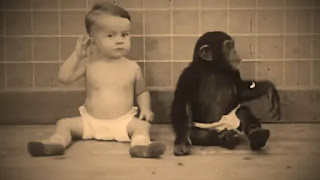Winthrop
and Luella Kellogg raised their son Donald with a chimp 'sister' called
Gua but ended up abandoning their experiment after noticing disturbing
changes in their baby boy
Married animal
psychologists Winthrop and Luella Kellogg decided to raise a baby
chimpanzee called Gua alongside their ten-month-old son Donald.
At
seven months old, Gua was just three months younger than her 'brother',
and the Florida-based scientists were interested in seeing whether
sharing his upbringing could lead to her developing human behaviours,
and even communication skills.
The experiment,
which began in 1931, was intended to last for five years, but the
Kelloggs had no choice but to pull the plug after just nine months,
after seeing the chilling way it had affected young Donald.
Donald's 'sibling' greatly impacted his speech and behaviours
Both
babies were raised in the exact same manner, as per the Smithsonian
Magazine, sleeping in similar beds, and playing with similar toys. All
the while, Winthrop and Luella carried out a series of experiments of
the 'siblings'. These included topics such as "blood pressure, memory,
body size, scribbling, reflexes, depth perception, vocalization,
locomotion, reactions to tickling, strength, manual dexterity, problem
solving, fears, equilibrium, play behaviour, climbing, obedience,
grasping, language comprehension, attention span, and others."
At
first, Gua raced ahead of Donald in most areas, given that chimpanzees
develop quicker than humans, and could even respond to phrases such as
'Don't touch!' and 'Get down!', as reported by NPR, but ultimately hit
her limits when it came to human speech.
Psychological
Record authors wrote that the Kelloggs' experiment 'probably succeeded
better than any study before its time in demonstrating the limitations
heredity placed on an organism regardless of environmental opportunities
as well as the developmental gains that could be made in enriched
environments." While Gua never learned to speak, however, Donald was
greatly impacted by her way of communicating.
when he wanted more food, and would even mimic Gua's movements, clambering around on a
Gua raced ahead of Donald in a number of development areas
Little
Donald began to imitate Gua's grunts and screechesll
fours as though he was a chimp himself. The Kelloggs reported: "Whenever
an orange or other desired food was observed and barked for by Gua.
Donald would usually take up this imitative call." It's reported that
clever Gua even taught Donald how to spy on people.
Donald's
parents also noticed Donald wrestling with his 'sister', biting people,
and generally behaving in an animal-like way. The reason behind the
abrupt end of the experiment remains mysterious, although it's believed
by some that the impact Gua was having on Donald's language development
could have been cause for concern.
The experiment ended abruptly
Authors
of The Psychological Review expressed concerns at the time surrounding
why the experiment ended far sooner than anticipated, writing: "We are
told that the study was terminated on March 28, 1932, when Gua was
returned to the Orange Park primate colony through a gradual
rehabilitating process. But as for why, the Kelloggs, who are so
specific on so many other points, leave the reader wondering."
OZY
reports that mother Luella had become particularly concerned about
Donald's behaviour, believing he was becoming more chimp than human.
Another theory is that Gua had become significantly stronger than
Donald, and the Kelloggs had begun to fear for their son's safety.
Sadly,
after Gua was sent away, she died of pneumonia just one year later, at
the age of three. Not much is known about the life of Donald, or the
impact the experiment had on him. It is known however that he tragically
died by suicide in January 1973, aged just 43, just one year after the
deaths of Winthrop and Luella in 1972.










.png)
Comments
Post a Comment